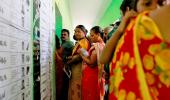Politics is not on the radar of 18 to 21-year-old Indians, reveals Rama Bijapurkar.

The low registration of first-time voters has justifiably caused a lot of concern and comment.
'Apathy', 'Cynicism' and logistical difficulties are some explanations given.
This column shares some findings of a recent ethnographic study on young India that may shed more light on this phenomenon.
Called Drivers of Destiny, the study was done with 18 to 21 year olds, who have just entered or will soon enter the workforce, and 22 to 30 year olds, who will soon become the ruling age cohort.
Drawn from large and small towns of Ahmedabad, Aurangabad, Mumbai, Bengaluru, Chennai, Coimbatore, Hyderabad, Kolkata, Guwahati, Jamshedpur, Lucknow and Delhi, the respondents had some years of college education (dropouts, and all grades of colleges were included).
Many were first-time collegegoers in their family -- not surprising, given India's education demographics.
A good way to think about them (which was the basis for the sample design) is that they represent the 'leading edge' of the 'mass' or 'middle' young India, and form the core of tomorrow's India.
The study was not about voting behaviour but getting a holistic and 'people-level' understanding of the young men and women who would power India through the next half century at least -- understanding their inside world and how they make sense of the complex outside world, seen through their prism.
Quantitative surveys have produced limited insight on a subject so complex and deeply layered, hence the ethnographic approach was deployed to hear and understand from inside the group rather than impose frameworks for understanding from outside of it.
The study, commissioned by this columnist, was led by Dr Mathangi Krishnamurthy, associate professor of anthropology at IIT-Madras, with a team of young researchers that she assembled.
First a quick demographic reality-check on this group.
The majority are from modest-income homes and have had 'modest' quality of education, as expected but often not acknowledged.
Seventy per cent urban and 58 per cent rural respondents are still students, and only 5 to 8 per cent urban/rural say they are unemployed (2023, TGI data from Kantar).
The hardest hit by lack of jobs are 22 to 30 year olds: 53 per cent urban and 73 per cent rural are married, and only 8 to 13 per cent are still students.
The ethnographic study findings suggest that politics is not on the radar of 18 to 21 year old Indians.
The majority do not read about politics or see themselves as a political voice.
They also do not make the connection between 'My vote' and 'the government', which they see clearly as an entity that does things, a sort of a utility.
Many want a predictable government job. They do not see themselves as having high stakes in political movements and are not interested in voting.
Clearly, colleges today are not the hotbed and cradle of politics they once used to be, where future political leaders would cut their teeth.
They are, however, very aware of social issues and know about Chandrayaan and its quest, Swachh Bharat, Make in India, social and communal clashes, conflicts between countries of the world, and so on, mostly through social media and the Internet.
They see politics as being about social issues and a means of social change, but their high engagement with social issues is through their very personal lens and their own immediate context: 'I want to change the world/I want the world to change to be a better place for me'.

Their idea of the 'nation' is only vaguely an ideological and institutional one needing work to strengthen.
More prominently, it is a social, personal, cultural entity that is their home -- 'not perfect, I want to go outside and see the world, but this is home, and it will get better slowly'.
They are aware of India's growing importance in the world and see it as a big positive.
Their dreams are plenty and very specific about all material things they would like for themselves, as also for their immediate community and those they consider their own.
But they also want happiness, joy, community, calm, and family support.
Parents are supportive, they feel, but limited in their ability to give the support that a trusted peer community can, though they struggle to get it, as it is not easily available.
They want the freedom to aspire but also the stability and rootedness of life, the liberalism and anonymity of a metro but also the sense of community of the small town.
On the flip side, 'entropy' and 'overwhelmed and anxious' probably describe this group best, and they live in the short term.
Overstimulated with information, social media, and a whirring hyperactive world, overwhelmed by the constant change around them, and anxious trying to cope, they are short on attention span and constantly in a state of mental movement.
Perhaps the lack of large institutions and predictable lives they can lean on is the cause of it -- this generation in India has a lot less of it than any generation before.
Social scientists think in terms of agency and structure -- respectively defined as the 'ability to affect their environment or make truly free choices' and 'conditions in the environment that limit choices and opportunities or define the range of actions available'.
Young India is hearteningly strong on agency, constantly buzzing with plans of what to do now and next, but sadly coming up against the harshness of structure.
Some survive and are resilient, others give up and are dispirited, and a few decide to work at making the structure better.
Rama Bijapurkar is a business advisor in the area of customer-based business strategy. Her forthcoming book is titled Lilliput Land: How Small Is Driving India's Mega Consumption Story.
Feature Presentation: Ashish Narsale/Rediff.com












 © 2025
© 2025